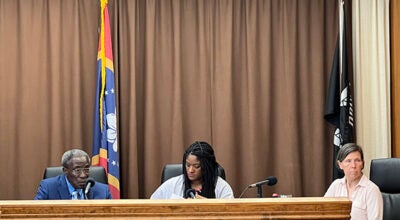Outlook: Turning back the clock doesn’t mean falling back on bad habits
Published 8:00 am Saturday, November 6, 2021

- Dr. Dan Edney
The clock is ticking, or should one say, not ticking.
Daylight saving time will come to an end at 2 a.m. Sunday, and most of the country will be turning their clocks back one hour. Hawaii and Arizona do not observe daylight saving time; therefore, time will continue for these two states.
Gaining an hour of sleep sounds much better than losing an hour of sleep, but neither will affect one’s health, Vicksburg physician Dr. Dan Edney said.
“In the 30 years I have had my practice I have never seen it (ill effects from the time change) or experienced it, personally,” Edney said.
However, for those with sleep disorders, Edney said, he recommends preparing for the transition the week before.
“The week before the time change, slowly adjust the times of going to bed and try to acclimate instead of doing it all in one night,” he said.
This can be done by adjusting bedtimes and wake-up times in 15-minute increments over the course of the week. The time change does not affect children in the same way it does adults, Edney said.
“They are able to adjust more quickly than the adult brain,” he said.
Although adjusting bedtimes and wake-up times in increments for children can be helpful, most important, Edney said, is keeping with the “same routine.” For parents of infants, time changes can be a challenge. One hour can make a big difference for feedings.
“It takes longer for babies to adjust because they are on their own schedule,” Edney said, but they too, can be transitioned slowly.
“But you are not going to do it all at one time,” he said.
Daylight saving time was first enacted in Germany during World War I, because more daylight meant the country could conserve fuel and power. Shortly after, the U.S. decided to do the same.
After the war, daylight saving ended, internationally, but in the U.S., states were allowed to decide whether they wanted to keep it or return to standard time.
This did not work out well, because it created a transportation nightmare, similar to when time zones were enacted in 1883. The time differences caused confusion with the railroad companies, which resulted in train crashes.
To resolve the problem, in 1966 the United States Department of Transportation was founded. It was given power over daylight saving time and dates for the twice-yearly transition were set by law.
Transitioning from daylight saving time to standard time or vice versa may not affect one’s health, but it can make for a few drowsy days.
Arizona opted out of transitioning to daylight saving time because while most of the country benefited financially from an extra hour of daylight, its energy consumption rose.
For Hawaii, there was no advantage to having daylight saving time because, being close to the equator, sunrises and sunsets don’t vary like those further north.
Currently, there are 19 states, Mississippi being one, that have either enacted legislation or passed resolutions that could eliminate the lethargy brought on by the time changes.
These measures would allow for year-round daylight saving time if Congress were to amend the federal law.
But until then, folks can plan on springing forward or falling back an hour on the second Sunday in March and the first Sunday in November, respectively.
Edney said he wished the time changes had begun on a Saturday instead of a Sunday.
“For me, that messes up going to church because if you lose an hour, you still have to get up and go. Saturday you can flex easier,” he laughed.






